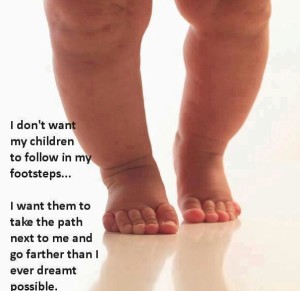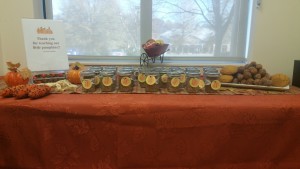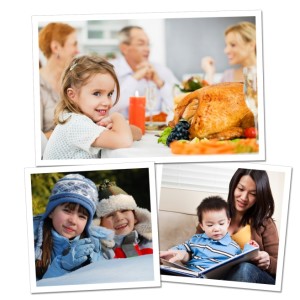From the Principal’s Desk:
Social Development in Preschoolers
At age three, your child will be much less selfish than she was at two. He or she will also be less dependent on you, a sign that there own sense of identity is stronger and more secure. Now they will actually play with other children, interacting instead of just playing side by side. In the process, they will recognize that not everyone thinks exactly as they do and that each of there playmates has many unique qualities, some attractive and some not. You’ll also find them drifting toward certain children and starting to develop friendships with them. As they create these friendships, they will discover that many children have special qualities that make him/her likable—a revelation that will give a vital boost to there self-esteem.
There’s some more good news about your child’s development at this age: As they becomes more aware of and sensitive to the feelings and actions of others, they will gradually stop competing and will learn to cooperate when playing with her friends. They are capable of taking turns and sharing toys in small groups, even if she doesn’t always do it. Instead of grabbing, whining, or screaming for something, they actually ask politely much of the time. As a result, you can look forward to less aggressive behavior and calmer play sessions. Often three-year-olds are able to work out their own solutions to disputes by taking turns or trading toys.
However, particularly in the beginning, you’ll need to encourage this type of cooperation. For instance, you might suggest that they “use his or her words” to deal with problems instead of violent actions. Also, remind her that when two children are sharing a toy, each gets an equal turn. Suggest ways to reach a simple solution when another child want the same toy, perhaps drawing for the first turn or finding another toy or activity. This doesn’t work all the time, but it’s worth a try. Also, help them with the appropriate words to describe there feelings and desires so that they doesn’t feel frustrated. Above all, show them by your own example how to cope peacefully with conflicts. If you have an explosive temper, try to tone down your reactions in their presence. Otherwise, they will mimic your behavior whenever they are under stress.
Inspirational Quotes for parents:

Volunteer Spotlight:

We want to thank Brittany Jordan for putting together a wonderful Teacher Appreciation November Event. The teachers loved the pumpkin brown sugar body scrub and treats. YUMMY!!!!

SAVE THE DATE:
We will be closing at noon on December 24th and all day December 25th for the holiday day.
Our annual staff holiday luncheon will be December 16th. This is a great way to show the staff your appreciation. We will have sign up sheets at the front desk thank you for all you do!
Parent Reminders
-
Please be sure to wash your child’s hands upon entering the classroom.
-
If your child has received any new immunizations, please make sure we have an updated record in your child’s file.
-
All outside food must be store bought.
-
Inform the front office if your emergency contact information changes.
-
Please sign your child in and out each day.
-
Label all your child’s belongings.
-
Please put appropriate foot wear on your child for active play.
It is time for our FALL ANCILLARY PROGRAMS





Monday Morning: Daisy Dance is a ballet, tap and a creative movement dance program designed to teach children a life long love of movement and provide a foundation for all dance genres. Please click here for the registration form. You can add dance at the beginning of each month.
Tuesday Morning: Preschool Music Adventure is an original approach that successfully engages active preschoolers in musical activities, in order to enhance their overall development. We are very excited about this new music program. We will have a new music session starting in January.
Wednesday Afternoon: T.O.T (Teams of Tomorrow) is an awesome training program that focuses on basketball handling and dribbling skills. The onsite classes are fun, educational and active. Please click here to access the registration form.
Thursday Morning: Soccer Shots is a popular non-competitive youth soccer program. This program teaches confidence, fun, character, teamwork, coordination and imagination. Our Next session will begin in March.
Friday Morning: King Tiger Tae Kwon Do is taught according to individual needs and levels of skills. Students begin to establish, and actually achieve, personal goals. Students learn that, by setting realistic goals and applying dedication and hard work, anything is possible. They develop confidence! The virtues of Respect, Concentration, Discipline, and Motivation are the characteristics of a truly confident individual. We will have a new session beginning Friday,Oct. 30th -Dec.18th. Registration forms are located at the front desk.
It’s that time of year again…colds and flu
A common myth is that exposure to cold and wind make children more likely to catch a cold or flu virus. According to the American Academy of Pediatrics, cold weather is not the cause of either the flu or colds. Both cold and flu viruses are more common in the winter and children in child care are in close contact with each other and can spread the germs. Washing hands frequently and teaching children to sneeze or cough into their elbows help reduce the spread of colds and flu. Active play helps build the immune system and increases a child’s ability to fight off a cold or the flu. Bundle up and enjoy the outdoors – especially in the winter!
Child Care Rules for Outdoor Time
- The latest changes to NC Child Care Rules .0508 and .1718 specify that preschool children in child care should have a minimum an hour of time outdoors every day, weather permitting.
The Child Care Rules include the definition for weather permitting in Rule .0102 (16). Weather permitting refers to appropriate temperature, air quality and precipitation for outdoor learning activities and play.
Exploring Holiday Traditions from Around the World

The holiday season is here, providing a wealth of opportunities to enrich the children’s understanding of diverse cultures and traditions around the world. In addition, our students will share their own traditions with others. Below are age appropriate activities that we use in the classroom, as well as activities for you and your child to do at home.
BEGINNERS (ages 2-3):
In the classroom: As they near the age of two, children begin to recognize the sights and sounds of holidays celebrated by their family. Parents visit our classrooms to share holiday traditions, including unique books, songs and activities.
At home: Gather family photos and point out traditions, such as unwrapping presents, eating holiday dinner at grandma’s house, and making a snowman. Encourage your child to talk about what he sees in the photos.
Recommended reading: Children Around the World Celebrate Christmas by Christine Tangvald, Happy Hanukkah, Corduroy by Don Freeman, My First Kwanzaa by Karen Katz
INTERMEDIATES (ages 3-4):
In the classroom: Children sing holiday songs from around the world and are introduced to holiday symbols that they may see in their communities, such as Christmas trees or Hanukkah menorahs.
At home: Take a drive with your child or bring him to various holiday festivals in your community. Encourage him to look for and identify holiday decorations.
Recommended reading: Christmas Around the World by Calliope Glass, Hanukkah Hop by Erica Silverman, Li’l Rabbit’s Kwanzaa by Donna Washington
PRE-K/PRE-K2 (ages 4-5)
In the classroom: After learning about holiday traditions around the world, our older preschoolers identify countries on a globe. For example, they might learn about Diwali, the festival of lights, and then find India on the globe. They might make tamales, a dish often served on Christmas, and then find Mexico on the globe.
At home: Ask your child to help you prepare your family’s favorite holiday foods. Talk about the long-standing traditions in which these foods are rooted. For instance, you might explain, “I used to bake cookies for the holidays with my mom. Now we can start baking cookies together!”
Recommended reading: Children Just Like Me: Celebrations by Anabel Kindersley, Light the Lights: A Story about Celebrating Hanukkah and Christmas by Margaret Moorman, The Story of Kwanzaa by Mary Washington
Exposing children to various holiday traditions helps them build strong social skills, establish a sense of self, and respect the differences of others as they transition into elementary school and beyond.
– Lauren Starnes, PhD – Director of Early Childhood Education

December Newsletter
From the Principal’s Desk:
Social Development in Preschoolers
At age three, your child will be much less selfish than she was at two. He or she will also be less dependent on you, a sign that there own sense of identity is stronger and more secure. Now they will actually play with other children, interacting instead of just playing side by side. In the process, they will recognize that not everyone thinks exactly as they do and that each of there playmates has many unique qualities, some attractive and some not. You’ll also find them drifting toward certain children and starting to develop friendships with them. As they create these friendships, they will discover that many children have special qualities that make him/her likable—a revelation that will give a vital boost to there self-esteem.
There’s some more good news about your child’s development at this age: As they becomes more aware of and sensitive to the feelings and actions of others, they will gradually stop competing and will learn to cooperate when playing with her friends. They are capable of taking turns and sharing toys in small groups, even if she doesn’t always do it. Instead of grabbing, whining, or screaming for something, they actually ask politely much of the time. As a result, you can look forward to less aggressive behavior and calmer play sessions. Often three-year-olds are able to work out their own solutions to disputes by taking turns or trading toys.
However, particularly in the beginning, you’ll need to encourage this type of cooperation. For instance, you might suggest that they “use his or her words” to deal with problems instead of violent actions. Also, remind her that when two children are sharing a toy, each gets an equal turn. Suggest ways to reach a simple solution when another child want the same toy, perhaps drawing for the first turn or finding another toy or activity. This doesn’t work all the time, but it’s worth a try. Also, help them with the appropriate words to describe there feelings and desires so that they doesn’t feel frustrated. Above all, show them by your own example how to cope peacefully with conflicts. If you have an explosive temper, try to tone down your reactions in their presence. Otherwise, they will mimic your behavior whenever they are under stress.
Inspirational Quotes for parents:
Volunteer Spotlight:
We want to thank Brittany Jordan for putting together a wonderful Teacher Appreciation November Event. The teachers loved the pumpkin brown sugar body scrub and treats. YUMMY!!!!
SAVE THE DATE:
We will be closing at noon on December 24th and all day December 25th for the holiday day.
Our annual staff holiday luncheon will be December 16th. This is a great way to show the staff your appreciation. We will have sign up sheets at the front desk thank you for all you do!
Parent Reminders
It is time for our FALL ANCILLARY PROGRAMS
Monday Morning: Daisy Dance is a ballet, tap and a creative movement dance program designed to teach children a life long love of movement and provide a foundation for all dance genres. Please click here for the registration form. You can add dance at the beginning of each month.
Tuesday Morning: Preschool Music Adventure is an original approach that successfully engages active preschoolers in musical activities, in order to enhance their overall development. We are very excited about this new music program. We will have a new music session starting in January.
Wednesday Afternoon: T.O.T (Teams of Tomorrow) is an awesome training program that focuses on basketball handling and dribbling skills. The onsite classes are fun, educational and active. Please click here to access the registration form.
Thursday Morning: Soccer Shots is a popular non-competitive youth soccer program. This program teaches confidence, fun, character, teamwork, coordination and imagination. Our Next session will begin in March.
Friday Morning: King Tiger Tae Kwon Do is taught according to individual needs and levels of skills. Students begin to establish, and actually achieve, personal goals. Students learn that, by setting realistic goals and applying dedication and hard work, anything is possible. They develop confidence! The virtues of Respect, Concentration, Discipline, and Motivation are the characteristics of a truly confident individual. We will have a new session beginning Friday,Oct. 30th -Dec.18th. Registration forms are located at the front desk.
It’s that time of year again…colds and flu
A common myth is that exposure to cold and wind make children more likely to catch a cold or flu virus. According to the American Academy of Pediatrics, cold weather is not the cause of either the flu or colds. Both cold and flu viruses are more common in the winter and children in child care are in close contact with each other and can spread the germs. Washing hands frequently and teaching children to sneeze or cough into their elbows help reduce the spread of colds and flu. Active play helps build the immune system and increases a child’s ability to fight off a cold or the flu. Bundle up and enjoy the outdoors – especially in the winter!
Child Care Rules for Outdoor Time
The Child Care Rules include the definition for weather permitting in Rule .0102 (16). Weather permitting refers to appropriate temperature, air quality and precipitation for outdoor learning activities and play.
Exploring Holiday Traditions from Around the World
The holiday season is here, providing a wealth of opportunities to enrich the children’s understanding of diverse cultures and traditions around the world. In addition, our students will share their own traditions with others. Below are age appropriate activities that we use in the classroom, as well as activities for you and your child to do at home.
BEGINNERS (ages 2-3):
In the classroom: As they near the age of two, children begin to recognize the sights and sounds of holidays celebrated by their family. Parents visit our classrooms to share holiday traditions, including unique books, songs and activities.
At home: Gather family photos and point out traditions, such as unwrapping presents, eating holiday dinner at grandma’s house, and making a snowman. Encourage your child to talk about what he sees in the photos.
Recommended reading: Children Around the World Celebrate Christmas by Christine Tangvald, Happy Hanukkah, Corduroy by Don Freeman, My First Kwanzaa by Karen Katz
INTERMEDIATES (ages 3-4):
In the classroom: Children sing holiday songs from around the world and are introduced to holiday symbols that they may see in their communities, such as Christmas trees or Hanukkah menorahs.
At home: Take a drive with your child or bring him to various holiday festivals in your community. Encourage him to look for and identify holiday decorations.
Recommended reading: Christmas Around the World by Calliope Glass, Hanukkah Hop by Erica Silverman, Li’l Rabbit’s Kwanzaa by Donna Washington
PRE-K/PRE-K2 (ages 4-5)
In the classroom: After learning about holiday traditions around the world, our older preschoolers identify countries on a globe. For example, they might learn about Diwali, the festival of lights, and then find India on the globe. They might make tamales, a dish often served on Christmas, and then find Mexico on the globe.
At home: Ask your child to help you prepare your family’s favorite holiday foods. Talk about the long-standing traditions in which these foods are rooted. For instance, you might explain, “I used to bake cookies for the holidays with my mom. Now we can start baking cookies together!”
Recommended reading: Children Just Like Me: Celebrations by Anabel Kindersley, Light the Lights: A Story about Celebrating Hanukkah and Christmas by Margaret Moorman, The Story of Kwanzaa by Mary Washington
Exposing children to various holiday traditions helps them build strong social skills, establish a sense of self, and respect the differences of others as they transition into elementary school and beyond.
– Lauren Starnes, PhD – Director of Early Childhood Education